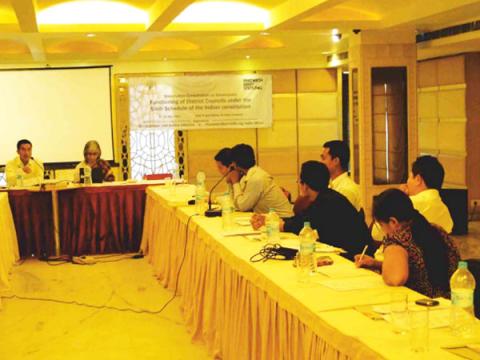Development and Justice Initiative organized in collaboration with Friedrich-Ebert-Stiftung, India Office, a Stakeholder Consultation on Governance in Autonomous Councils under the Sixth Schedule of the Indian Constitution on 9 – 10 May, 2012 in Guwahati, Assam.
The focus areas of governance debate were: delivery of basic services, infrastructure development and management of natural resources. Participants included representatives of civil society organisations from the ADC areas of Assam and Meghalaya, academics, elected representatives and students. Village level processes and autonomy of the ADCs to plan, execute and monitor the delivery of services and undertake development were discussed.
The local bodies and government departments were responsible to provide basic services. It was observed that there was a lack democratic participation in terms of planning, implementation, monitoring and audit across all service including the Public Distribution System in this process. A majority of the Centrally Sponsored Schemes are being entirely planned and managed by the government departments with some stake of the ADCs. Therefore it was recommended that participation of the community, particularly of women members, be ensured in all programs and projects that provide basic services and have the financial resources to build infrastructure such as school buildings, AW centres, rural hospitals, village roads etc. A social audit by the community, with equal participation of women and men, of all such programs and services provided by the ADCs and government departments should be mandatory.
Indigenous tribal people in the states covered by the Sixth Schedule have traditionally had strong systems of community participation in decision making. However these forums, called by different names among different communities, excluded women and youth. The Sixth Schedule itself focused more on the cultural and religious autonomy of the communities. In a changed context where states have the responsibility to uphold the rights of children, women and other margianlised sections of the population, it is imperative that full participation of these sections be ensured. This needs to be institutionalized. Therefore it was recommended that village level forums for participation of all adults of the community with constitutional recognition and powers be constituted. An elected executive body with at least 33% of the seats reserved for women be put into place with elections conducted by an independent commission. These institutions be empowered to plan, implement, select beneficiaries, monitor and audit all the services and programs of the central, state governments and ADCs. However, any legislation leading to the creation of these institutions should follow broad-based consultations in the areas concerned.
A delegation of participants and representatives of the organizers met with the Chief Minister of Assam, Shri Tarun Gogoi, who promised the team that his office will give due consideration to the recommendations of the Consultation in any changes that may be initiated in the system of governance in the ADCs of Assam.

